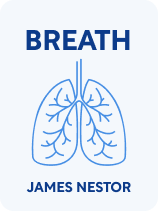

This article is an excerpt from the Shortform book guide to "Breath" by James Nestor. Shortform has the world's best summaries and analyses of books you should be reading.
Like this article? Sign up for a free trial here.
What is overbreathing? What are the dangers of chronic overbreathing?
Many people have a problem with overbreathing—breathing a greater amount of air than necessary. Overbreathing purges carbon dioxide from the body, which short-circuits the necessary chemical exchange and starves our cells of the very oxygen they need.
Keep reading to learn about the effects of overbreathing and what to do about it.
Overbreathing
Overbreathing, whether during exercise or the normal course of life, overworks your metabolism and throws off your body’s balance of oxygen and carbon dioxide. Carbon dioxide, argues Nestor, is more than just a gas we expel—it’s a vital part of the chemical exchange that provides oxygen to our organs. Rapid, heavy breathing purges carbon dioxide from our bodies, reducing the distribution of oxygen to our cells. You may take in more oxygen to your lungs, but without the right balance of carbon dioxide in your blood, you’ll simply breathe most of the oxygen right back out.
(Shortform note: The rate of oxygen absorption by the lungs is surprisingly low. We normally breathe in 5-8 liters of air per minute, which contains 1-1.5 liters of oxygen but provides only 0.3 liters of oxygen to the blood, roughly 5% of the volume of air inhaled. As breathing increases during exercise, the rate of oxygen extracted per volume of air drops as low as 3%.)
No one understands this feeling better than people who suffer from asthma. Once you start hyperventilating, no matter how much you breathe, your body knows you’re not getting enough oxygen and desperately reaches for more, to no avail. Nestor points to a study at Southern Methodist University in which people suffering from asthma attacks were trained to take shallow breaths, not deep ones, resulting in a lessening of symptoms.
| The Science of Asthma The 2014 study at Southern Methodist University overturned the idea that taking deep breaths can help curb asthma symptoms. Participants in the study coupled shallow breathing with self-monitoring via biofeedback techniques to consciously track their oxygen levels. While the study showed that shallower breaths were beneficial, the biofeedback process helped make the results longer-lasting. What actually causes asthma is unknown, but a number of triggers and risk factors are well-established, such as allergies, infections, certain medications, exposure to cigarette smoke, and other airborne particulates. While it was once believed that asthmatics were oversensitive to changes in their bodies’ carbon dioxide levels, research has shown that people with asthma may actually be less sensitive to carbon dioxide. |
Because of the importance of the body’s oxygen/carbon dioxide balance, Nestor argues that so-called “oxygen bars” (spas and gym kiosks where you breathe purified oxygen) have no benefit. Any excess oxygen you breathe is immediately exhaled, unprocessed. An extra supply of oxygen is only medically useful at high altitudes and for people who cannot maintain a healthy amount of oxygen saturation in their blood.
(Shortform note: Oxygen bars, which tout the health benefits of breathing high doses of oxygen, rose in popularity in the early 2000s. Oxygen bar proprietors claim that their spas reduce stress while boosting energy and endurance. The American Lung Association disagrees and suggests there may be negative effects from particulates these spas use to scent the air.)

———End of Preview———
Like what you just read? Read the rest of the world's best book summary and analysis of James Nestor's "Breath" at Shortform.
Here's what you'll find in our full Breath summary:
- Why you're probably breathing wrong
- The benefits of learning how to breathe properly
- The potentially dangerous side effects of mouthbreathing






